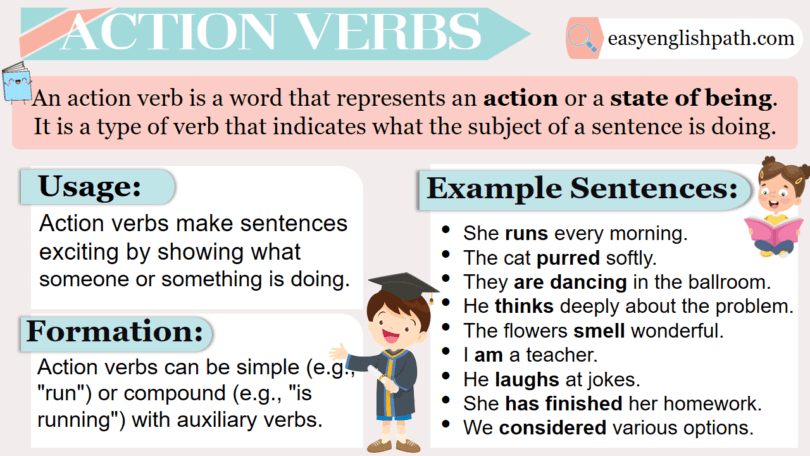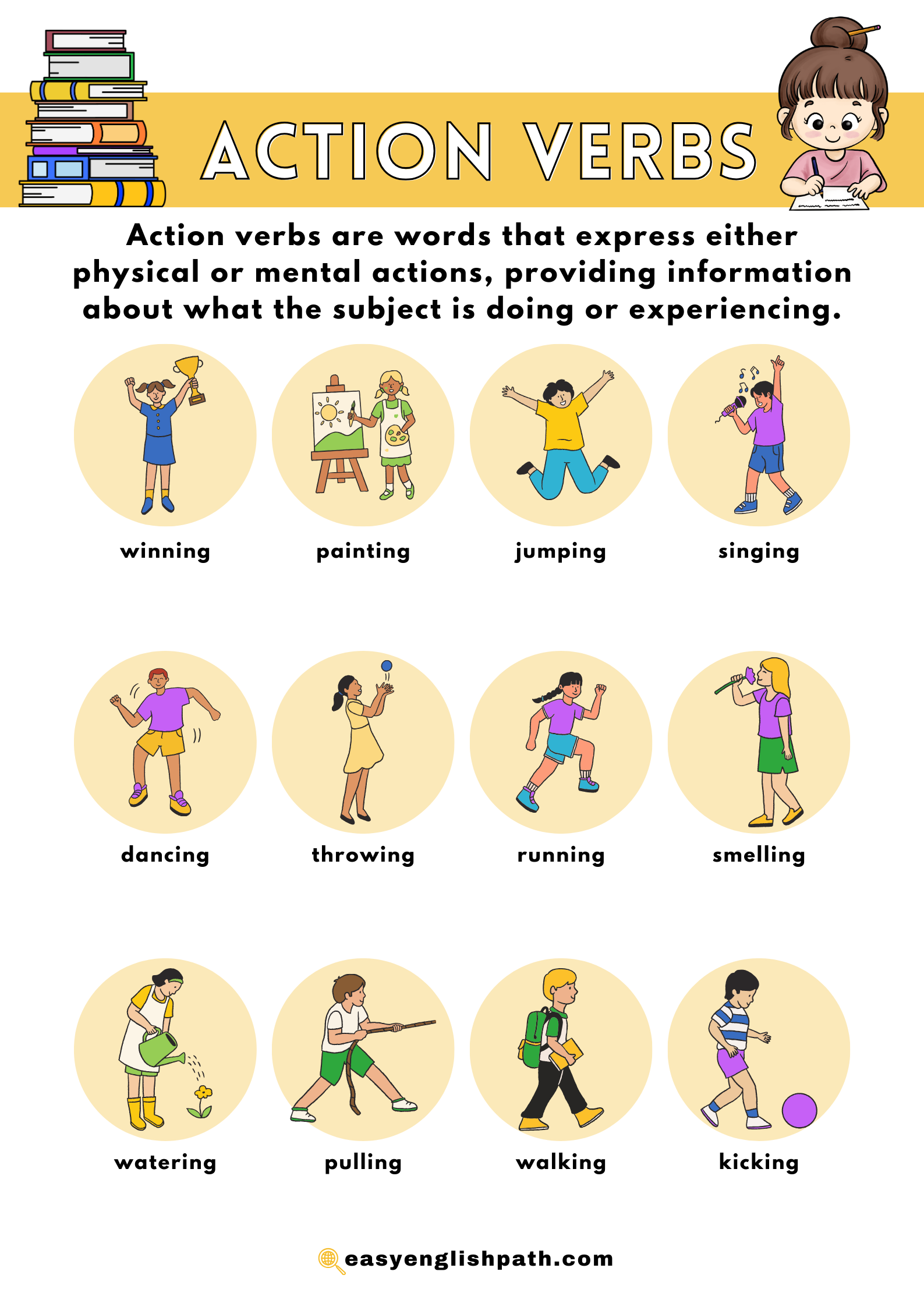Action verbs are like the movers in grammar. They do things or show when something exists. Without them, sentences feel stuck. Action Verbs Examples help us say who does what and when. Simple things, like eating or playing, happen because of these verbs. Action verbs are one of the types of verbs. They make sentences interesting and clear. When you talk or write, using action verbs is like adding the energy that keeps everything going. So, whether it’s a walk in the park or a chat with a friend, These are the helpers that make sure your words have life.
What are Action Verbs?
Action verbs, or dynamic or active verbs, express an action, occurrence, or state of being. These verbs convey a sense of activity and are essential for describing what someone or something is doing. Unlike linking verbs that connect the subject to a subject complement (describing the subject), action verbs highlight the action itself.
Examples:
- Run: She runs every morning.
- Jump: The athlete jumped over the hurdle.
- Write: He writes articles for a magazine.
- Sing: The birds are singing in the trees.
Types of Action Verbs:
- Physical Action Verbs
- Mental Action Verbs
- Transitive Action Verbs
- Intransitive Action Verbs
- Causative Verbs
- Perception Verbs
- Dynamic Verbs
- Stative Verbs
Physical Action Verbs:
These verbs describe movements or physical activities.
Examples:
- She runs every morning.
- He jumps over the puddle.
- They swim in the lake.
- The cat climbs the tree.
- We all love to dance at parties.
Mental Action Verbs:
These verbs relate to mental processes or cognitive activities.
Examples:
- I always think before I speak.
- She enjoys imagining new possibilities.
- He remembers his childhood fondly.
- We try to understand different perspectives.
- The students are eager to learn new concepts.
Transitive Action Verbs:
Transitive verbs are verbs that require a direct object to complete their meaning. They express actions that affect something or someone.
Examples:
- She writes a letter.
- They are building a sandcastle.
- I need to buy groceries.
- He fixes his bike.
- We play the guitar.
Intransitive Action Verbs:
Intransitive verbs don’t need a direct object to complete their meaning. They stand alone, expressing a complete action or state.
Examples:
- She always runs in the morning.
- The baby laughs loudly.
- They arrived early.
- The cat sleeps peacefully.
- He danced at the party.
Causative Verbs:
These verbs indicate causing someone or something to do something.
Examples:
- She made him a cup of tea.
- Let’s make them smile.
- He allowed them to enter.
- The noise forced her to wake up.
- I’ll have them call you.
Perception Verbs:
These verbs relate to the five senses and describe perceiving something.
Examples:
- She sees a beautiful sunset.
- We hear music in the distance.
- He tastes the delicious soup.
- They smell the flowers in the garden.
- I touch the soft fabric.
Dynamic Verbs:
Dynamic verbs express actions or processes and emphasize movement or change. They describe observable activities and are applicable in various tenses.
Examples:
- The chef is preparing a delicious meal.
- The weather is changing rapidly.
- She runs every morning.
- They played basketball yesterday.
Stative Verbs:
Stative verbs describe a state, condition, or static quality, often related to emotions, senses, or possession. They express a situation that is not dynamic and typically does not involve observable actions.
Examples:
- The package weighs two kilograms.
- She knows the answer to the question.
- He loves chocolate ice cream.
Action Verbs Example Sentences:
- She dances gracefully in the spotlight.
- We completed the project ahead of schedule.
- The sun sets over the horizon every evening.
- Running marathons requires endurance and determination.
- They celebrated their anniversary with a romantic dinner.
- The cat purred contentedly on the windowsill.
- The students studied diligently for their exams.
- I enjoy exploring new places and trying new foods.
- The storm raged outside, with thunder and lightning.
- Learning a new language opens up new opportunities.
Verbs Exercise in English:
1. Which sentence contains an action verb?
a) The cat jumped over the fence.
b) She is feeling happy today.
c) They played soccer in the park.
2. Identify the main action verb in the following sentence:
“The students have been studying for the exam.”
a) studying
b) have
c) been
3. Choose the sentence with the correct action verb tense:
a) She will be going to the store after work.
b) She goes to the store after work.
c) She go to the store after work.
4. Select the sentence with the correct subject-action verb agreement:
a) The group of students is finishing their project.
b) The group of students are finishing their project.
c) The group of students were finishing their project.
5. Which sentence uses an action verb?
a) The sun sets in the west.
b) The cat sleeps peacefully.
c) An interesting book captured her attention.
6. Which sentence uses an action verb?
a) The sun sets in the west.
b) The cat sleeps peacefully.
c) Engrossed in its pages, she discovered a fascinating story.
7. Choose the correct sentence with an irregular action verb:
a) Yesterday, she run five miles.
b) Yesterday, she runs five miles.
c) Yesterday, her determination led her to run five miles.
Answers:
a) The cat jumped over the fence.
a) studying
b) She goes to the store after work.
a) The group of students is finishing their project.
a) An interesting book captured her attention.
b) Engrossed in its pages, she discovered a fascinating story.
c) Yesterday, her determination led her to run five miles.
You May Also Like this






